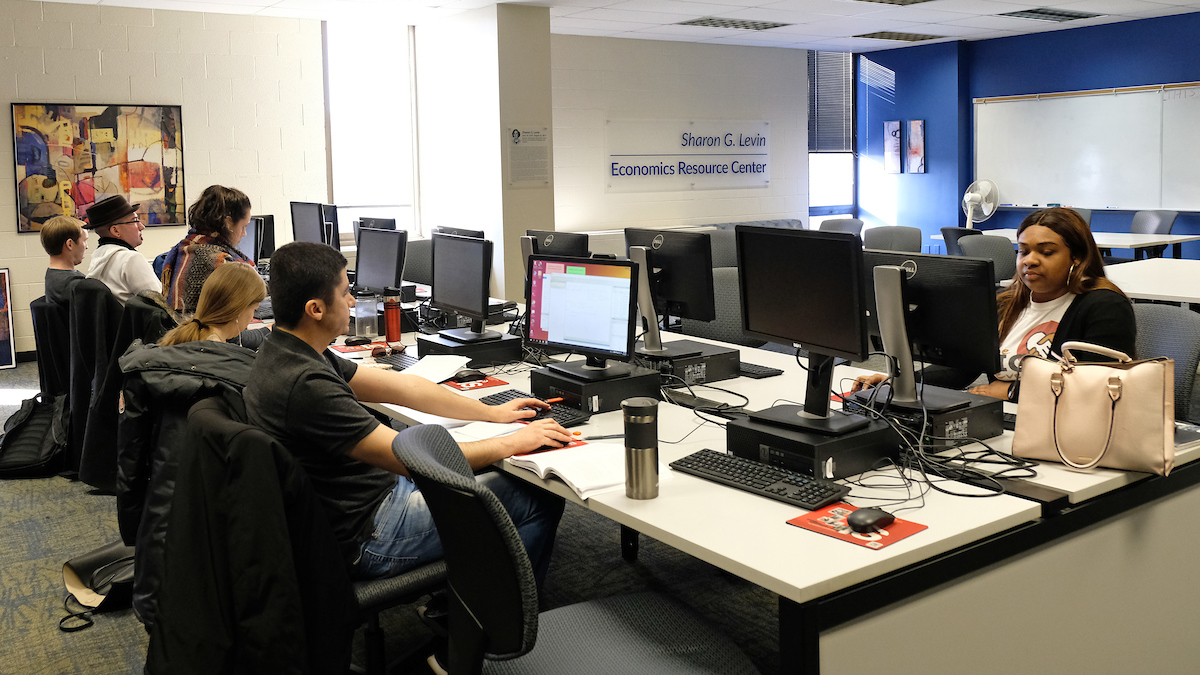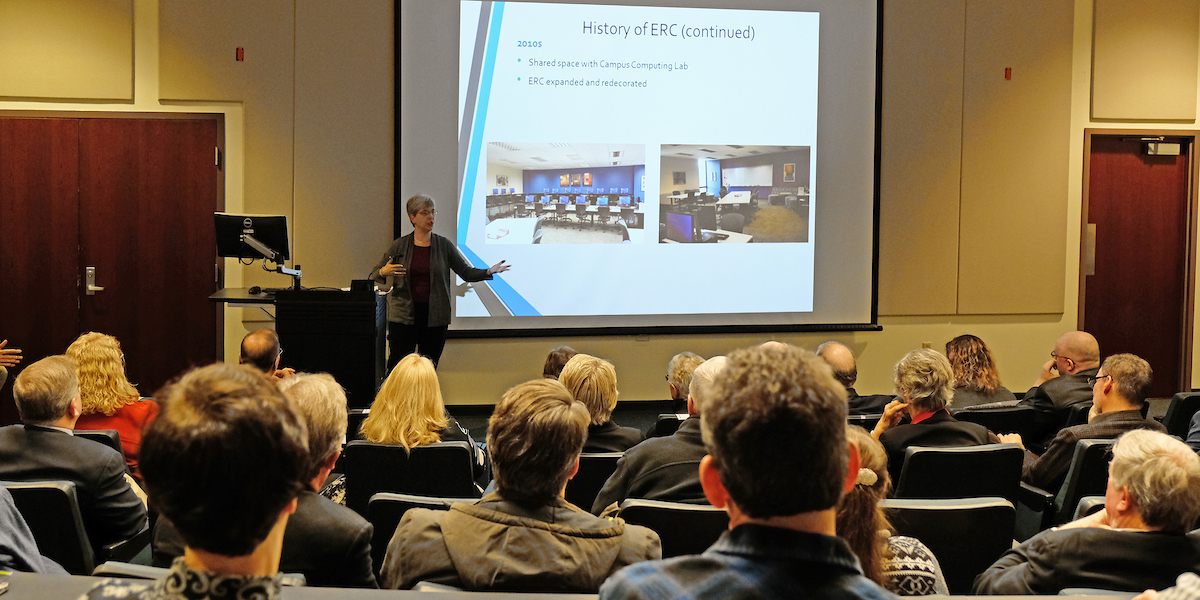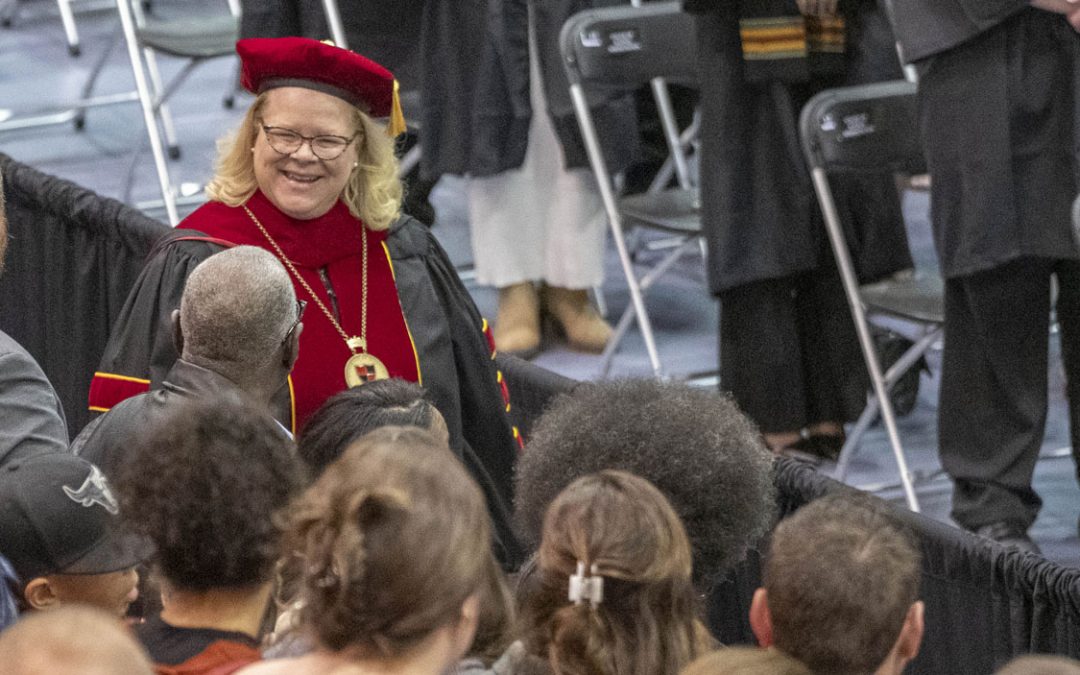
A new sign hangs on the wall in the newly renamed Sharon G. Levin Economics Resource Center where students work last week on the fourth floor of the Social Sciences & Business Building. (Photos by August Jennewein)
The Economics Resource Center has long been at the heart of the Department of Economics at the University of Missouri–St. Louis, serving students as a place to seek tutoring help, work together or just hang out.
It is only fitting then that Sharon G. Levin’s name will now hang inside it.
The lab in Room 452 of the Social Sciences & Business Building was renamed in honor of the late professor emeritus and former chair Wednesday at the end of a memorial service that recalled her innumerable contributions to the department and the field right up until her death last August.
“I, like everybody in the room, was tremendously saddened by Sharon’s loss,” said Anne Winkler, chair of the Department of Economics, as she welcomed a group of about 50 people into the auditorium at Gallery 210. “But at the same time, today is a celebration of all things Sharon. So I think today we can really revel in the happy memories of having known Sharon. She has touched all of us in so many ways.”
Levin’s husband, Stanford Levin, professor emeritus of economics at Southern Illinois University Edwardsville, and her friend and longtime collaborator Paula Stephan, a professor of economics at Georgia State University, shared stories about her early career in a field in which women – both when she finished her PhD at the University of Michigan in 1973 and still today – are underrepresented.
They also spoke of Levin’s prolific track record of research and publications, including the book “Striking the Mother Lode in Science: The Importance of Age, Place, and Time,” co-authored with Stephan and published by Oxford University Press in 1992. Levin and Stephan detailed the how success in science critically depends on being at the right place at the right time, and among their conclusions, they wrote that “not all generations of scientists have equal access to the types of jobs that foster productivity, nor do they have the good fortune to be educated when path-breaking events are occurring in their field.”

Anne Winkler, chair of the Department of Economics, talks about the history of the Economics Resource Center before officially renaming it in honor of late Professor Sharon G. Levin during a memorial service last Wednesday in Gallery 210.
UMSL colleagues Winkler and Professor Susan Feigenbaum – both of whom Levin hired during her nearly 15 years as chair – reinforced her extraordinary research and publishing success as well as the tireless energy she devoted to mentoring students and colleagues. Feigenbaum also discussed the integral role Levin played in the development of the department, particularly in the area of applied econometrics.
She is credited with spearheading the BS/MA Dual Degree Program, one of the first such programs on campus.
Levin also played a role in changes in the ERC – many of them overseen by another of her hires, Teaching Professor Michael Allison – that have made it a place for students to gather and collaborate.
“On Sharon’s behalf, I want to thank you,” Feigenbaum told Allison during her remarks. “It gave her tremendous pleasure to see all of our students there, working and debating.”
Levin’s daughter, Allison Levin – who teaches communications sports management at Webster University – said her mother understood the value of collaboration.
“We don’t succeed unless we have a support system around us, so she was always looking to hook people up,” Allison Levin said. “No, she wasn’t a matchmaker, but she wanted economic students to get to know each other and for the department to be a place where even commuters knew they had a safe space to do homework, get help and let out steam. Over mom’s tenure, the ERC became this safe haven.”
Now, it bears her name. New signs were installed both inside the ERC and right outside the door on Tuesday, along with a plaque commemorating her.
Among those in attendance at Wednesday’s service were family members, friends, colleagues and former students – as well as students who might not have known Levin but felt her impact.
One was Marisa Klein, who graduated with a bachelor’s degree in economics in 2012 and earned her master’s three years later. She met Levin only once but was a recipient of a scholarship named for her.
“It was incredibly helpful and a huge honor,” Klein said of receiving the scholarship. “I was kind of new to the program, and I believe Anne Winkler was the one that recommended me for it, and it just reinforced the notion that economics was the right path for me.”














